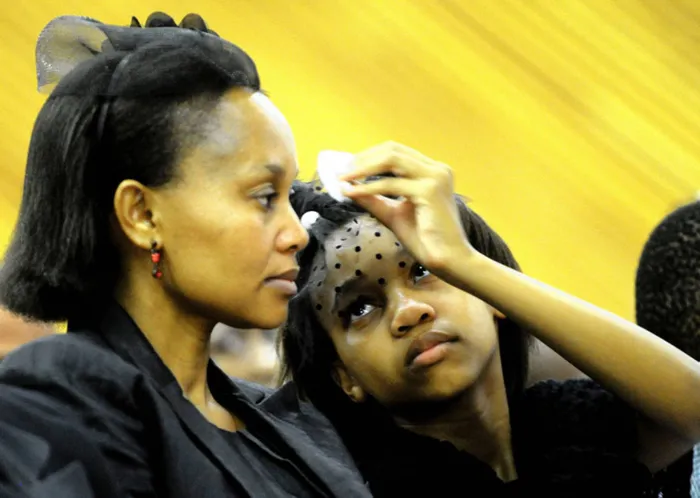Death penalty call after doctor killed

Brenda Moche speaks to her daughter, Masego, at a memorial service for her husband, John, as her son listen's to a colleague of his father. Moche was gunned down in a hijacking last Friday Picture : Sizwe Ndingane Brenda Moche speaks to her daughter, Masego, at a memorial service for her husband, John, as her son listen's to a colleague of his father. Moche was gunned down in a hijacking last Friday Picture : Sizwe Ndingane
At an emotionally charged memorial service after the murder of internationally renowned South African dermatologist, Dr John “Oupa” Moche, the head of the South African Medical Association (Sama) has called for a robust debate on the return of the death penalty.
Moche, Steve Biko Academic Hospital’s dermatology department head and one of SA’s 166 dermatologists, was gunned down last Friday in a hijacking in Riviera.
The doctor and a nurse he was dropping off at home were sitting in his new Range Rover when two attackers shot Moche in the heart before speeding off in his vehicle.
The car was later found abandoned in Atteridgeville.
Police spokesman Lieutenant-Colonel Lungelo Dlamini said no arrests have been made. The investigation was spearheaded by several high ranking police officers.
As hundreds of mourners – including some of the country’s leading medical minds and government officials – filled the University of Pretoria’s Normal Hall in Groenkloof on Thursday, Sama chairman, Dr Norman Mabasa, called for a robust debate on the death penalty.
“This country is under siege. The number of people who die at the hands of criminals is higher than in countries embroiled in civil wars or from natural disasters.
“Crime has become so bad that soon we are going to have to put burglar bars around our beds,” he said, hammering home his point.
Mabasa said while crime statistics made the country’s decreasing murder rate look good, it was not.
“Why are we rejoicing when there are a thousand fewer people murdered? Surely we don’t think the decrease is because criminals are lazy?” he asked.
The country’s citizens should be gauging the success in the fight against crime by the number of cases, “especially murders” being solved, Mabasa said. “What has happened to the cases of the country’s murdered doctors, nurses and medical practitioners? We must demand why these and other murders are not being solved.
“We cannot allow this killing with impunity to continue.
“Kill and you will be killed. This is the message that needs to be sent out,” said Mabasa.
Moche’s wife and two young children sat wiping away tears as pictures of his life, graduation and family outings wereshown on slide screens.
Friends and colleagues sang his praises, calling Moche a “true son of Africa devoted to duty”.
“There was no other like him. His drive and passion for serving the poor and ordinary South Africans was unprecedented”, said Professor Deepak Modi, Witwatersrand University dermatology department head and chief specialist.
Praising his close friend, Modi said Moche was the best student Wits had had the pleasure of training.
“He would have become the country’s leading dermatologist and was to be an esteemed professor, who was a true gentleman.
“He was always the first at work and the last to leave and gave his everything to his work,” he said.
Dr Robert Weiss, SA Dermatology Society president, said the murder had caused irreparable damage to the country.
“South Africa had up until now only 166 dermatologists, of which 100 are in private practice, with a large number either having retired or left the country, leaving a minority to treat over 50 million people.
“John was one of those few individuals who was truly dedicated to providing better health care to all South Africans. It takes a truly special person to take this kind of job and John was one of those people.
“He was a true gem who was prepared to get involved in community work, who had knowledge beyond the books,” he said.
Gauteng Health MEC Ntombi Mekgwe said it was a dark day in the country’s health sector.
“(South Africa has) been robbed of an asset and is poorer for this heinous crime which has stolen (from us) a new breed of young professional dedicated to the greater good of our people.” - Pretoria News